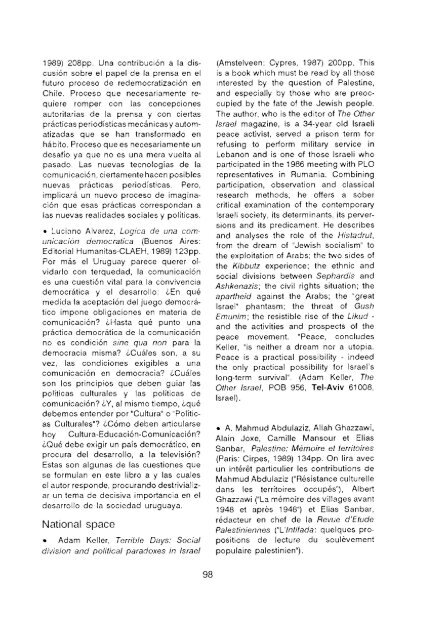ifda dossier 74 - Dag Hammarskjöld Foundation
ifda dossier 74 - Dag Hammarskjöld Foundation
ifda dossier 74 - Dag Hammarskjöld Foundation
You also want an ePaper? Increase the reach of your titles
YUMPU automatically turns print PDFs into web optimized ePapers that Google loves.
1989) 208pp. Una contribucion a la dis-<br />
cusion sobre el papel de la prensa en el<br />
future proceso de redemocratizacion en<br />
Chile. Proceso que necesariarnente re-<br />
quiere romper con las concepciones<br />
autoritarias de la prensa y con ciertas<br />
practicas periodisticas mecanicasy autom-<br />
atizadas que se han transformado en<br />
habito. Proceso que es necesariamente un<br />
desafio ya que no es una mera vuelta al<br />
pasado. Las nuevas tecnologias de la<br />
comunicacion. ciertarnente hacen posibles<br />
nuevas practicas periodisticas. Pero,<br />
irnplicara un nuevo proceso de imagina-<br />
cion que esas practicas correspondan a<br />
las nuevas realidades sociales y politicas.<br />
Luciano Alvarez, Logica de una comunicacihn<br />
democratica (Buenos Aires:<br />
Editorial Humanitas-CLAEH, 1989) 123pp.<br />
Por mas el Uruguay parece querer olvidarlo<br />
con terquedad, la comunicacion<br />
es una cuestion vital para la convivencia<br />
democratica y el desarrollo: LEn qu6<br />
medida la aceptacion del juego democratico<br />
impone obligaciones en materia de<br />
cornunicaci6n? 6Hasta qu6 punto una<br />
prictica democratica de la comunicacion<br />
no es condition sine qua non para la<br />
democracia rnisma? 6Cuales son, a su<br />
vez, las condiciones exigibles a una<br />
comunicacion en democracia? LCuales<br />
son 10s principios que deben guiar las<br />
politicas culturales y las politicas de<br />
comunicaci~n? LY, al mismo tiempo, Lqu6<br />
debemos entender por "Cultura" o "Politicas<br />
Culturales"? 6Como deben articularse<br />
hoy Cultura-Educacion-Comunicacion?<br />
LQu6 debe exigir un pays democratico, en<br />
procura del desarrollo, a la television?<br />
Estas son algunas de las cuestiones que<br />
se formulan en este libro a y las cuales<br />
el autor responde, procurando destrivializar<br />
un terna de decisiva importancia en el<br />
desarrollo de la sociedad uruguaya,<br />
National space<br />
Adarn Keller, Terrible Days: Social<br />
division and political paradoxes in Israel<br />
(Amstelveen: Cypres, 1987) 200pp. This<br />
is a book which must be read by all those<br />
interested by the question of Palestine,<br />
and especially by those who are preoc-<br />
cupied by the fate of the Jewish people.<br />
The author, who is the editor of The Other<br />
Israel magazine, is a 34-year old Israeli<br />
peace activist, served a prison term for<br />
refusing to perform military service in<br />
Lebanon and is one of those Israeli who<br />
participated in the 1986 meeting with PLO<br />
representatives in Rumania, Combining<br />
participation, observation and classical<br />
research methods, he offers a sober<br />
critical examination of the contemporary<br />
Israeli society, its determinants, its perver-<br />
sions and its predicament. He describes<br />
and analyses the role of the Histadrut,<br />
from the dream of "Jewish socialism" to<br />
the exploitation of Arabs; the two sides of<br />
the Kibbutz experience; the ethnic and<br />
social divisions between Sephardis and<br />
Ashkenazis; the civil rights situation; the<br />
apartheid against the Arabs; the "great<br />
Israel" phantasm; the threat of Gush<br />
Emunim; the resistible rise of the Likud -<br />
and the activities and prospects of the<br />
peace movement. "Peace, concludes<br />
Keller, "is neither a dream nor a utopia.<br />
Peace is a practical possibility - indeed<br />
the only practical possibility for Israel's<br />
long-term survival". (Adam Keller, The<br />
0tl1er Israel, FOB 956, Tel-Aviv 61008,<br />
Israel).<br />
A. Mahmud Abdulaziz, Allah Ghazzawi,<br />
Alain Joxe, Camille Mansour et Elias<br />
Sanbar, Palestine: Memoire et territoires<br />
(Paris: Cirpes, 1989) 134pp. On lira avec<br />
un interet particulier les contributions de<br />
Mahmud Abdulaziz ("Resistance culturelle<br />
dans les territoires occupes"), Albert<br />
Ghazzawi ("La memoirs des villages avani<br />
1948 et apres 1948") et Elias Sanbar,<br />
redacteur en chef de la Revue d'Etude<br />
Palestiniennes ("L'lntifada: quelques pro-<br />
positions de lecture du soulevement<br />
populaire palestinien").
















